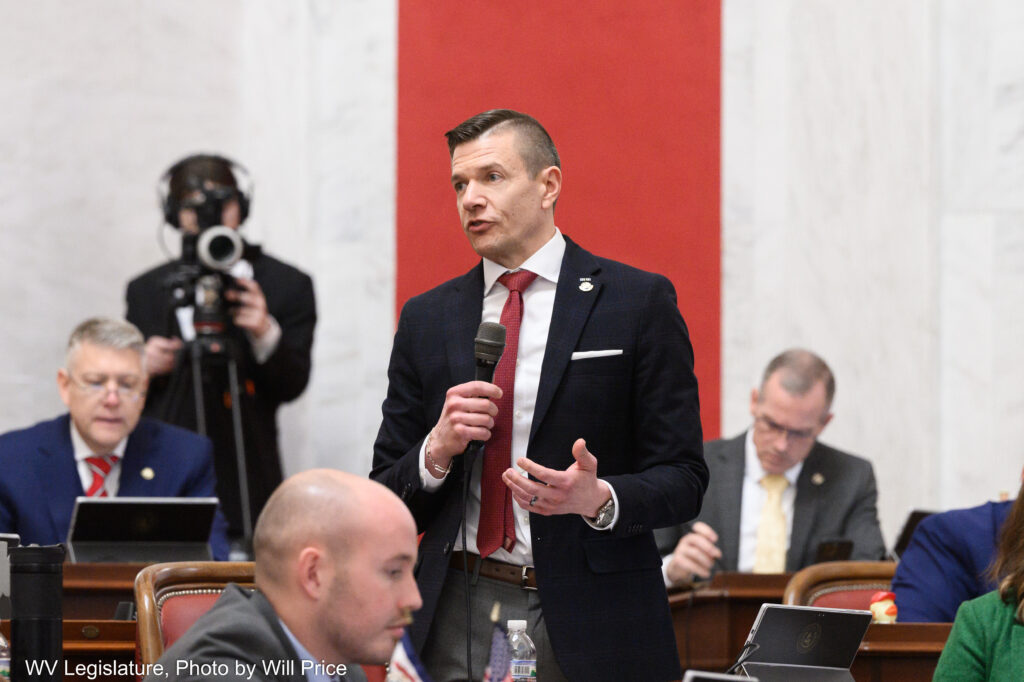In the Senate’s debate over whether to amend the vaccine exemptions bill, senators talked about polio, live aborted fetuses, and religious freedom.
This bill is one of the first bills to reach the Senate floor. It makes it easier for parents to receive an exemption for school vaccine requirements for their school-age children.
Four amendments were introduced. The amendments came from Republicans and Democrats, but none passed.
The first amendment was introduced by Sen. Ryan Weld, R-Brooke, and co-sponsored by Sen. Mike Woelfel, D-Cabell. It would have allowed private schools, and childcare centers to continue to require vaccines as a requirement for enrollment.
Woelfel, who is Catholic, said the bill would violate religious freedoms by forcing religious institutions to accept unvaccinated children.
“The bishop (Mark E. Brennan) has indicated clearly that his diocese will choose not to accept unvaccinated students,” Woelfel said.
He says without the amendment the bill could be unconstitutional.
“We took an oath to protect the Constitution and to uphold it,” Woelfel said. “When I say the Constitution, I really mean Article Three, Section 15 of our West Virginia constitution, which says the religious freedom is guaranteed.”
The bill originates from the Senate Health Committee.
Sen. Jack Woodrum, R-Summers, questioned the chair of that committee, Sen. Laura Chapman, R-Ohio, about the constitutionality of the bill.
“If we’re requiring them to take an unvaccinated student against the policy that they would prefer to have, is this any different than, say, the argument with the Christian bakery requiring them to bake cake,” Woodrum said.
Chapman asserted that this requirement that private schools accept vaccine exemptions is similar to other requirements that private schools have to follow, like fire safety laws and curriculum requirements.
Rollin Roberts, R-Raleigh, said he thought the amendment was disingenuous. He said the law would protect religious freedom, not restrict it.
“All of these years the religious preference has been ignored and trampled on, and now all of a sudden, they want to flip it around and use that as a defense,” Roberts said. “I find offense in that defense.”
Ultimately the amendment was rejected 10-21.
Weld’s second amendment was to fix the language in the bill that would remove the word public from the bill, a technicality that he says would make the bill inline with current case law. That amendment was also denied.
Woelfel asked for an amendment that would give the polio vaccine an exemption, meaning the polio vaccine would have still been required.
“These children are real people that are going to live in our state and will be born in our state,” Woelfel said. “Save them from this demon polio, please.”
Sen. Chapman urged legislators to reject the amendment.
“I think when we start parsing out specific vaccines any one of us can say, ‘Oh we don’t want X vaccine to come back or we don’t want Y disease to come back.’ We’re still violating children’s religious beliefs,” Chapman said.
Sen. Patricia Rucker, R-Jefferson, urged Senators to vote no to the amendment. She asserted that the polio vaccine comes from aborted fetuses.
“Those are mostly from voluntary abortions,” Rucker said. “And I do know that when they use those aborted fetal cells they must keep the subject, the person, the fetus alive, to take the cells out. The cells must be alive.”
However, according to a pro life organization, the Charlotte Lozier Institute, that is not currently true.
The Kanawha Health Department’s Doctor Steven Eshenaur said the vaccine being used in the United States comes from monkey kidney cells used to replicate the virus.
“It does not come from human fetuses,” Eshenaur said.
Regardless, that amendment failed 12-19.
Sen. Joey Garcia, D-Marion, asked for an amendment that would require private, public and parochial schools and child care centers to create a report laying out the numbers of what percentage of children in that facility are receiving a vaccination exemption.
“If this is the policy, give the citizens the right to make this informed decision about something that can affect their health and their lives,” Garcia said.
Objections came from members of the health committee, who raised concerns about burdening schools with more paperwork, and concerns about medical privacy.
“This is red tape on small businesses. I am friends with several private school administrators in my part of the state, and I can tell you, they operate on a very thin budget,” said Tom Will, R-Berkely.
That amendment failed 9-22.
The vaccine exemption bill was similar, but more extensive than a bill passed by the legislature last year that was vetoed by Gov. Jim Justice.
It differed from the bill that came from Gov. Patrick Morrisey’s office by not requiring schools to report the percentage of students who receive a vaccine exemption.
Members of the Senate say the bill will likely receive a final vote on Friday. If passed, it heads to the House of Delegates.























